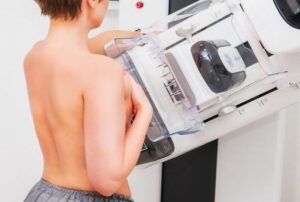Breast density is a crucial factor in assessing breast health. Every woman has a different breast density, and understanding the relationship between breast density and health risks is essential.
1. What Is Breast Density?
The breast is composed of three main components:
- Fibrous tissue: Supports and shapes the breast.
- Glandular tissue: Responsible for milk production, including lobules and the duct system.
- Fatty tissue: Acts as a cushion between fibrous and glandular tissue, determining breast size.

Breast density is determined by the ratio of fibrous and glandular tissue (dense tissue) to fatty tissue (non-dense tissue). Doctors can only assess breast density through mammograms.
According to the BI-RADS system, breast density is classified into four categories:
- A: Mostly fatty tissue (10% of women).
- B: Scattered areas of fibroglandular tissue, but mostly fatty tissue (40% of women).
- C: Heterogeneously dense, with a majority of dense tissue (40% of women).
- D: Extremely dense, mostly composed of dense tissue (10% of women).
2. Why Is Breast Density Important?
Breast density affects two key aspects:
- Breast cancer risk: Women with dense breasts have a higher risk of breast cancer, although the exact reason remains unclear.
- Mammogram accuracy: Dense breast tissue can obscure tumors, making early cancer detection more challenging.
3. Who Is More Likely to Have Dense Breasts?
Breast density changes over time, but certain groups are more likely to have dense breasts:
- Younger women.
- Pregnant or breastfeeding women.
- Women undergoing hormone replacement therapy.
- Women with lower body weight.
4. What Should You Do If You Have Dense Breasts?
Having dense breasts is a normal physiological condition. However, women should consult their doctor about their breast cancer risk and consider appropriate screening methods.
Additional screening techniques include:
- Breast ultrasound
- Breast MRI (Magnetic Resonance Imaging)
Talk to your doctor to determine the best timing and frequency for breast cancer screening.
Source: cdc.gov

